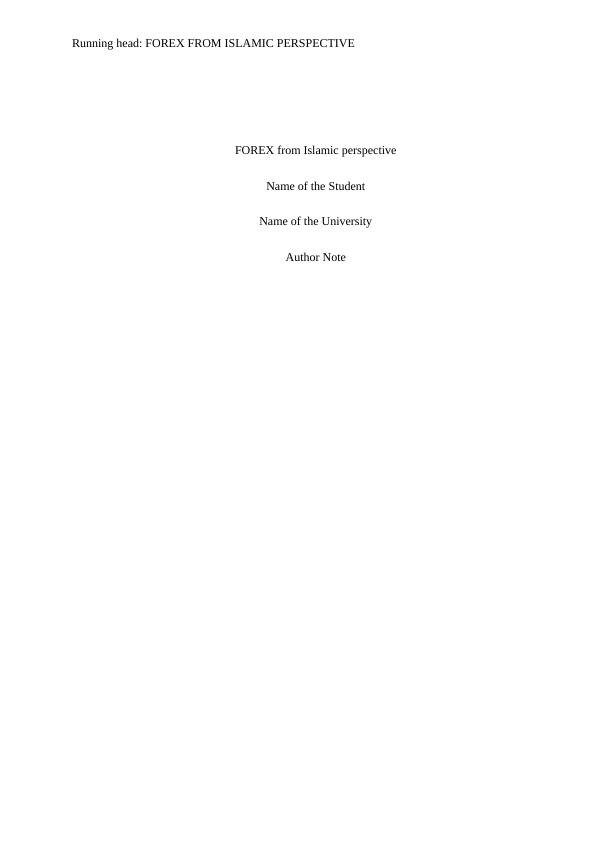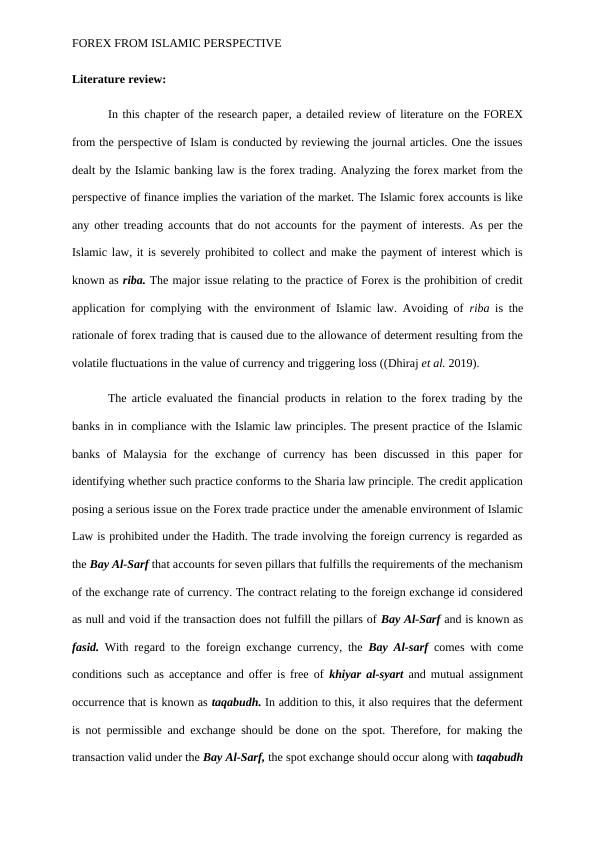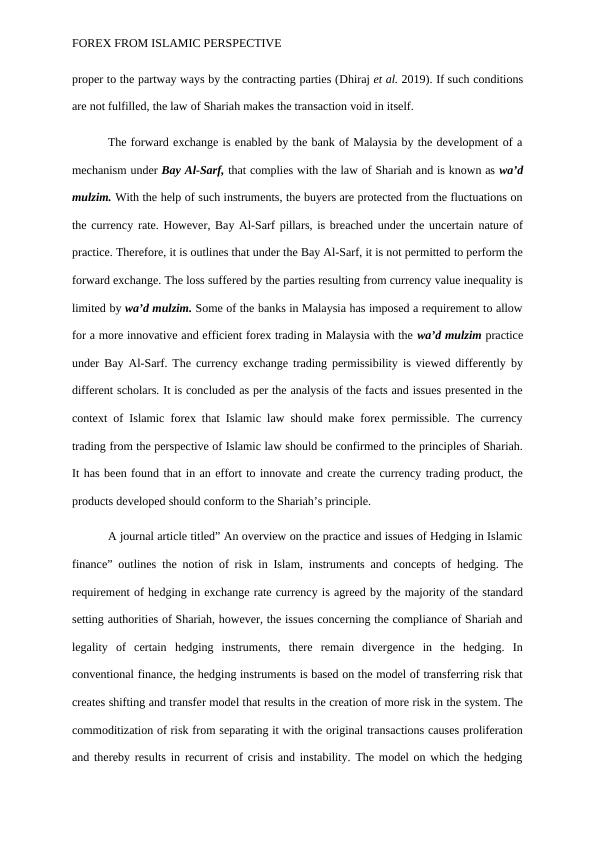FOREX FROM ISLAMIC PERSPECTIVE
6 Pages1351 Words22 Views
Added on 2022-09-09
FOREX FROM ISLAMIC PERSPECTIVE
Added on 2022-09-09
ShareRelated Documents
Running head: FOREX FROM ISLAMIC PERSPECTIVE
FOREX from Islamic perspective
Name of the Student
Name of the University
Author Note
FOREX from Islamic perspective
Name of the Student
Name of the University
Author Note

FOREX FROM ISLAMIC PERSPECTIVE
Literature review:
In this chapter of the research paper, a detailed review of literature on the FOREX
from the perspective of Islam is conducted by reviewing the journal articles. One the issues
dealt by the Islamic banking law is the forex trading. Analyzing the forex market from the
perspective of finance implies the variation of the market. The Islamic forex accounts is like
any other treading accounts that do not accounts for the payment of interests. As per the
Islamic law, it is severely prohibited to collect and make the payment of interest which is
known as riba. The major issue relating to the practice of Forex is the prohibition of credit
application for complying with the environment of Islamic law. Avoiding of riba is the
rationale of forex trading that is caused due to the allowance of determent resulting from the
volatile fluctuations in the value of currency and triggering loss ((Dhiraj et al. 2019).
The article evaluated the financial products in relation to the forex trading by the
banks in in compliance with the Islamic law principles. The present practice of the Islamic
banks of Malaysia for the exchange of currency has been discussed in this paper for
identifying whether such practice conforms to the Sharia law principle. The credit application
posing a serious issue on the Forex trade practice under the amenable environment of Islamic
Law is prohibited under the Hadith. The trade involving the foreign currency is regarded as
the Bay Al-Sarf that accounts for seven pillars that fulfills the requirements of the mechanism
of the exchange rate of currency. The contract relating to the foreign exchange id considered
as null and void if the transaction does not fulfill the pillars of Bay Al-Sarf and is known as
fasid. With regard to the foreign exchange currency, the Bay Al-sarf comes with come
conditions such as acceptance and offer is free of khiyar al-syart and mutual assignment
occurrence that is known as taqabudh. In addition to this, it also requires that the deferment
is not permissible and exchange should be done on the spot. Therefore, for making the
transaction valid under the Bay Al-Sarf, the spot exchange should occur along with taqabudh
Literature review:
In this chapter of the research paper, a detailed review of literature on the FOREX
from the perspective of Islam is conducted by reviewing the journal articles. One the issues
dealt by the Islamic banking law is the forex trading. Analyzing the forex market from the
perspective of finance implies the variation of the market. The Islamic forex accounts is like
any other treading accounts that do not accounts for the payment of interests. As per the
Islamic law, it is severely prohibited to collect and make the payment of interest which is
known as riba. The major issue relating to the practice of Forex is the prohibition of credit
application for complying with the environment of Islamic law. Avoiding of riba is the
rationale of forex trading that is caused due to the allowance of determent resulting from the
volatile fluctuations in the value of currency and triggering loss ((Dhiraj et al. 2019).
The article evaluated the financial products in relation to the forex trading by the
banks in in compliance with the Islamic law principles. The present practice of the Islamic
banks of Malaysia for the exchange of currency has been discussed in this paper for
identifying whether such practice conforms to the Sharia law principle. The credit application
posing a serious issue on the Forex trade practice under the amenable environment of Islamic
Law is prohibited under the Hadith. The trade involving the foreign currency is regarded as
the Bay Al-Sarf that accounts for seven pillars that fulfills the requirements of the mechanism
of the exchange rate of currency. The contract relating to the foreign exchange id considered
as null and void if the transaction does not fulfill the pillars of Bay Al-Sarf and is known as
fasid. With regard to the foreign exchange currency, the Bay Al-sarf comes with come
conditions such as acceptance and offer is free of khiyar al-syart and mutual assignment
occurrence that is known as taqabudh. In addition to this, it also requires that the deferment
is not permissible and exchange should be done on the spot. Therefore, for making the
transaction valid under the Bay Al-Sarf, the spot exchange should occur along with taqabudh

FOREX FROM ISLAMIC PERSPECTIVE
proper to the partway ways by the contracting parties (Dhiraj et al. 2019). If such conditions
are not fulfilled, the law of Shariah makes the transaction void in itself.
The forward exchange is enabled by the bank of Malaysia by the development of a
mechanism under Bay Al-Sarf, that complies with the law of Shariah and is known as wa’d
mulzim. With the help of such instruments, the buyers are protected from the fluctuations on
the currency rate. However, Bay Al-Sarf pillars, is breached under the uncertain nature of
practice. Therefore, it is outlines that under the Bay Al-Sarf, it is not permitted to perform the
forward exchange. The loss suffered by the parties resulting from currency value inequality is
limited by wa’d mulzim. Some of the banks in Malaysia has imposed a requirement to allow
for a more innovative and efficient forex trading in Malaysia with the wa’d mulzim practice
under Bay Al-Sarf. The currency exchange trading permissibility is viewed differently by
different scholars. It is concluded as per the analysis of the facts and issues presented in the
context of Islamic forex that Islamic law should make forex permissible. The currency
trading from the perspective of Islamic law should be confirmed to the principles of Shariah.
It has been found that in an effort to innovate and create the currency trading product, the
products developed should conform to the Shariah’s principle.
A journal article titled” An overview on the practice and issues of Hedging in Islamic
finance” outlines the notion of risk in Islam, instruments and concepts of hedging. The
requirement of hedging in exchange rate currency is agreed by the majority of the standard
setting authorities of Shariah, however, the issues concerning the compliance of Shariah and
legality of certain hedging instruments, there remain divergence in the hedging. In
conventional finance, the hedging instruments is based on the model of transferring risk that
creates shifting and transfer model that results in the creation of more risk in the system. The
commoditization of risk from separating it with the original transactions causes proliferation
and thereby results in recurrent of crisis and instability. The model on which the hedging
proper to the partway ways by the contracting parties (Dhiraj et al. 2019). If such conditions
are not fulfilled, the law of Shariah makes the transaction void in itself.
The forward exchange is enabled by the bank of Malaysia by the development of a
mechanism under Bay Al-Sarf, that complies with the law of Shariah and is known as wa’d
mulzim. With the help of such instruments, the buyers are protected from the fluctuations on
the currency rate. However, Bay Al-Sarf pillars, is breached under the uncertain nature of
practice. Therefore, it is outlines that under the Bay Al-Sarf, it is not permitted to perform the
forward exchange. The loss suffered by the parties resulting from currency value inequality is
limited by wa’d mulzim. Some of the banks in Malaysia has imposed a requirement to allow
for a more innovative and efficient forex trading in Malaysia with the wa’d mulzim practice
under Bay Al-Sarf. The currency exchange trading permissibility is viewed differently by
different scholars. It is concluded as per the analysis of the facts and issues presented in the
context of Islamic forex that Islamic law should make forex permissible. The currency
trading from the perspective of Islamic law should be confirmed to the principles of Shariah.
It has been found that in an effort to innovate and create the currency trading product, the
products developed should conform to the Shariah’s principle.
A journal article titled” An overview on the practice and issues of Hedging in Islamic
finance” outlines the notion of risk in Islam, instruments and concepts of hedging. The
requirement of hedging in exchange rate currency is agreed by the majority of the standard
setting authorities of Shariah, however, the issues concerning the compliance of Shariah and
legality of certain hedging instruments, there remain divergence in the hedging. In
conventional finance, the hedging instruments is based on the model of transferring risk that
creates shifting and transfer model that results in the creation of more risk in the system. The
commoditization of risk from separating it with the original transactions causes proliferation
and thereby results in recurrent of crisis and instability. The model on which the hedging

End of preview
Want to access all the pages? Upload your documents or become a member.
